Heart Rate Training

One of the most difficult lessons you’ll learn at running school is that in order to train hard, you don’t always need to run hard. In fact, tearing yourself a new one every time you go for a run can be counter-productive and leave you broken and disillusioned and sitting in the matron's office with a cup of strong sweet tea.
In my Training Toolkit article I explained how different runs help your body to adapt to faster running, and suggested that your training should include a healthy combination of these runs. But if part of the fun you get out of running is in challenging yourself, then it’s easy to struggle with motivation on slower runs, and tempting to push yourself every time you run. And that’s why I love heart rate training. Read on!
It starts with a nice lie down, ideally before you’ve even gotten out of bed. See just how low you can get your Resting Heart Rate (RHR) – it shows how much work your heart has to do just keeping your body functioning. An elevated resting heart rate can sometimes be the first sign that you’re getting a cold, or that you got wasted the previous night.
This next bit isn’t so much fun. Do a 5k as hard as you can, or run up and down a hill fast until you’re ready to puke. This helps find your Maximum Heart Rate (MHR), and thankfully you won’t have to spend much of your time here. You may have seen various ways to estimate this figure by subtracting 75% of your age in dog years from your mother’s maiden name, but there’s no substitute for the accuracy of testing it yourself.
Over time, you might find that your RHR falls as you become fitter – and you might find that you’ll exceed your MHR by a few beats during a particularly tough race. That’s cool, just check them every so often, and adjust the figures appropriately. It's not uncommon to occasionally see excessively high numbers - usually as 'spikes' when you look at your heart rate for an entire run - but this is often down to a variety of spurious reasons, including faulty chest straps, bad connections (not enough spit on the contacts), or an overhead powerline / passing meteor.
Heart rate is an excellent measure of how hard your body is working. Your pace might drop dramatically when running up a sand dune or gravelly hillside, but your ticker gives a truer picture of what your body is going through. The range between RHR (let’s call that 0%) and MHR (let’s call that 100%) has some important gear changes along the way. Enter your values to see your target figures:
| Recovery | Aerobic | Anaerobic | OMG! |
| 60-70% | 70-80% | 80-90% | 90-100% |
| Improves endurance and aerobic capacity, burning fat as a fuel without using too much glycogen. | In this range you begin to develop your cardiovascular system. | Here’s where to pitch a tempo run to help your muscles handle lactic acid. | This is where you should aim for during interval training to improve muscle fibres. |
| Up to 148bpm | 148-162bpm | 162-176bpm | 176-190bpm |
At low intensity, you fuel your muscles using fat and lots of oxygen – and training at this level helps your body adapt, improving the ability to deliver oxygen to your muscles and making this process more efficient. Many runners would benefit enormously from building a solid base of training at low intensity, to get their aerobic systems tuned up.
At high intensity, your muscles are working much harder, using a greater proportion of glycogen as a fuel, and your body has to deal with all sorts of chemical by-products, including the production of lactic acid. Pushing your training into these upper zones with tempo runs and interval training will help your body adapt to handle this too.
Fall between these two intensities, and you miss out on the training effect that they offer. Run in the middle and you’ll burn off your glycogen rather than tuning up your oxygen and fat burning systems. Train in the grey area between hard and easy and you won’t make your muscles work hard enough to teach them how to handle lactic acid. Training well is about understanding the importance of both processes, and devoting the right amount of time to each.
Earlier I hinted at how heart rate training can help during slower runs. Set your watch up to scream like a pound shop burglar alarm every time it goes over (say) 150bpm, force yourself to slow down until it stops beeping, and challenge yourself to see how fast you can run without setting it off. You’ll find yourself concentrating on your breathing, trying to run relaxed, and even completely forgetting about mileage, which I always find is a good place to be.
Of course, we’d all like to see our times improve when we are trying our hardest. But if you can improve your performance at low heart rates, and train your body to make better use of its fat-burning and oxygen-delivering capabilities, not only will that help your endurance, it follows that you’ll see an improvement in your race pace when your heart is working harder.
There’s no absolute need to wear a heart rate monitor to use this approach. It’s all about disciplining yourself to run at different levels of intensity, and you might find that you can do this by feel. But heart rate feedback will certainly help you to see just how hard you’re working when you run – and can definitely add an extra dimension of challenge to those slower runs.

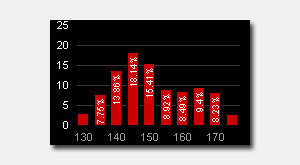
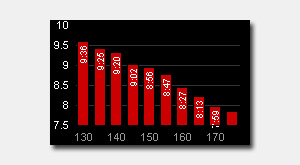
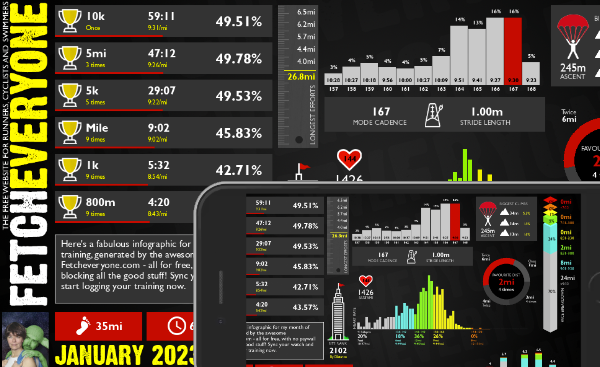
Monthly Summary
A brand new shareable infographic showing a colourful breakdown of your training month.

Marathon Prediction
We delve deeper to give you greater insights when working out your goal marathon time.
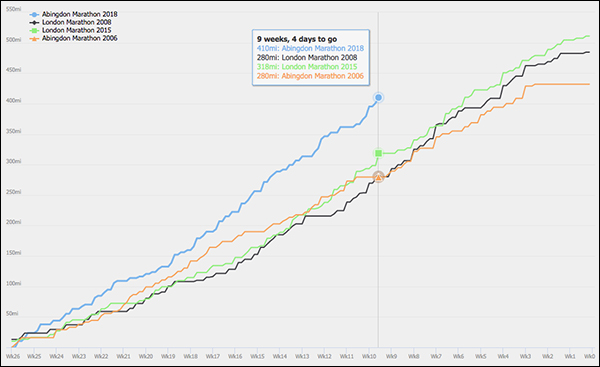
Pre-race Training Analysis
See your accumulated mileage in the weeks leading up to any event in your portfolio, and compare it to your other performances

Your 365 Day Totals
Peaks and troughs in training aren't easy to find. Unless you use this graph. Find out what your peak training volume really is
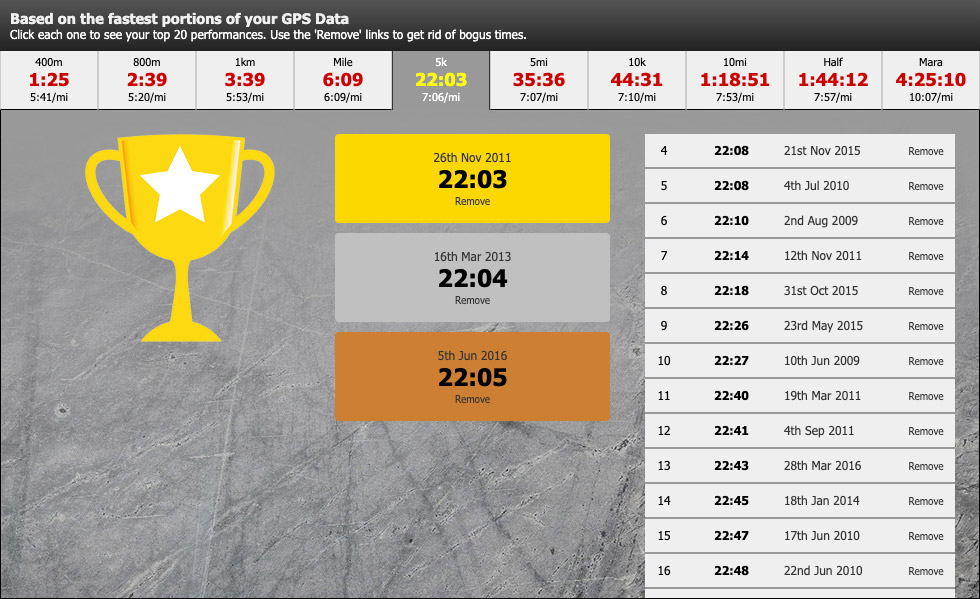
Benchmarks
See the fastest portions from all your training runs. Filter by time to give you recent bests to aim at. Every distance from 400m to marathon.
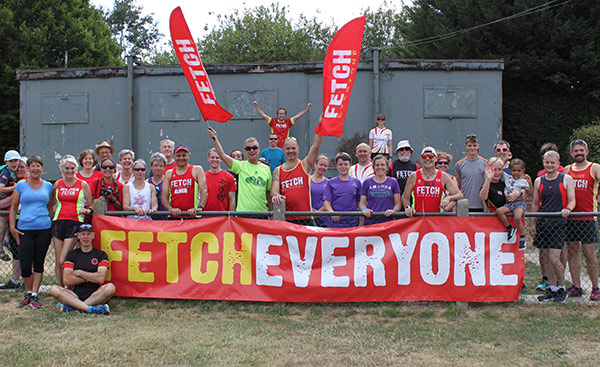
Fetch Everyone Running Club
Join our UKA-affiliated club for event discounts, London Marathon ballot places, the chance to get funded for coaching qualifications, and a warm feeling inside.

Leave a comment...
-
Interesting read. I have a HRM monitor but have used it about three times. I just have a hard time finding myself interested in it enough to make the effort to put the HRM on and record the results (yes very lazy!) I like graphs though and you have graphs to show progress so maybe that will be the key.
HermanBloom
-
But still no heart rate training category.

Corona
-
Shouldn't a tempo run be Anaerobic? Suggest race pace would be a better term to use in the high intensity paragraph? This is well described and I'm feeling keen to dig out the hrm.
Nightjar
-
And rightly so too Corona the HRM is just a tool to ensure that you do the type of session that you intend to - be it easy steady MP or tempo.
paul the builder
-
FS - it's not too bad to get going. Without knowing what your goals are - if you run say three times a week make that 1 x long slow run 1 x hard session and 1 x easy - using heart rate as a guide. And if you see a plan you like the look of that doesn't involve HRM then just use your HRM as a guide where it says 'hard' or 'easy' etc.
fetcheveryone
-
I have started using my HRM as I was struggling getting back into running forcing my body to where it used to be too fast so I am actually using it to slow me down so that over time I will gradually become strong enough to hold a faster pace.
Steady Edina
-
Good article. I'd like to add that to get a closer representation of your maxHR by whatever means you should rest up like you would for a race.
Boab
-
Ooh that bpm alarm game sounds fun. Though maybe not so much with all the hills around here...
Fat Dave
-
Threshold run is about 80% right?
Fat Dave
-
Wow thank you

fetcheveryone
-
Nice article sums up a complicated topic pretty well.
Parktic Thistle
-
Hi Gracie - you should seek some guidance from your GP/consultant on whether it's appropriate for you to do any sort of testing of max heart rates and following on from that the appropriateness of training at high intensity. I'm not sure how common AF is amongst runners but you could perhaps start a thread in the forum to ask for experiences from other runners who might have the condition. Sorry that I can't be more helpful.
fetcheveryone
-
Great article - much better explanation than I was given at a health check up a few years ago but so pleased I took their advice to use a HR monitor to check in which zones I was spending my training time as guess what unwittingly I favoured what you describe as 'the grey zone'. Being more aware of HR zones means body fat levels have fallen and fitness levels have improved. Susan
SusanP
-
Gracie - found a thread here for you: http://www.fetcheveryone.com/viewtopic.php?id50464&page1
fetcheveryone
-
I just go out and run. I do look at my data from my garmin at the end of a run. But I find I can run and feel knackered and do a rubbish time with lower hr and then when I feel great and having an easy run I have gone faster and my hr is higher. I think its how you feeling on the day you run.
Joe Ninety
-
Crikey - SusanP has posted a commend. Presumably the world has ended and this is a post-apocalyptic hallucination?
GregP
-
These percentages are based on your heart rate reserve rather than your maximum heart rate, stoibee65. In your case, I assume you have a maximum heart rate of 188 and a resting heart rate of 40. The difference between the two is your hrr of 148. 70% of 148 rounded up is 104, then you add your resting heart rate to that figure, giving 144 bpm.
paul sadler
To comment, you need to sign in or sign up!Tremendous article - reminds me of stuff I knew and then conveniently chose to forget.